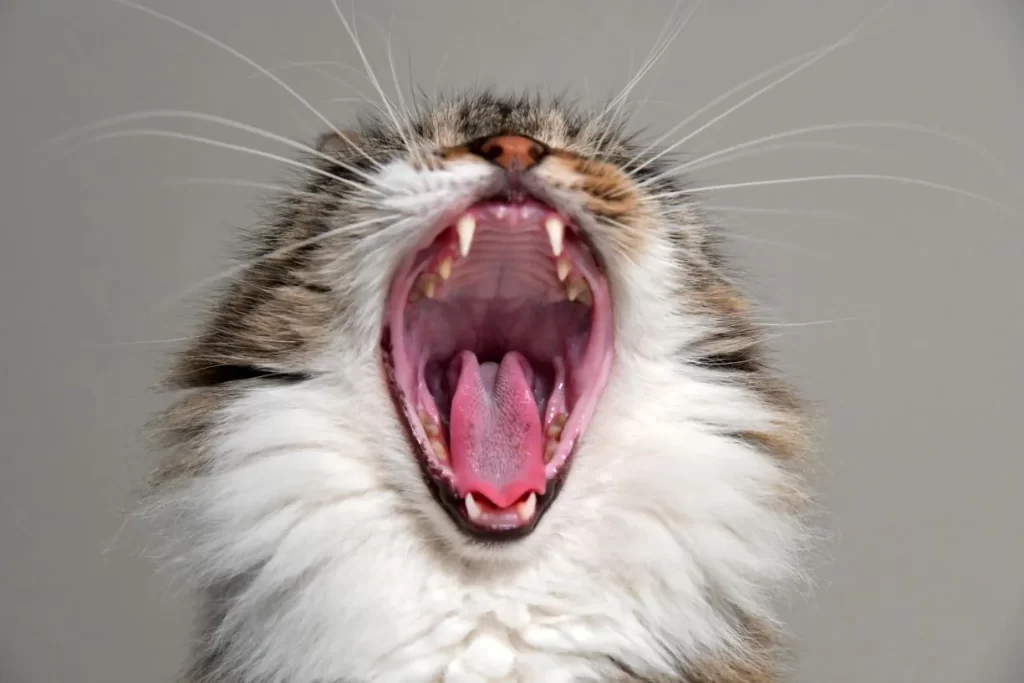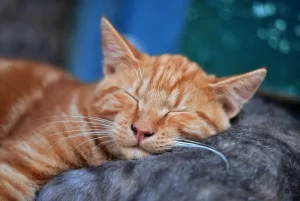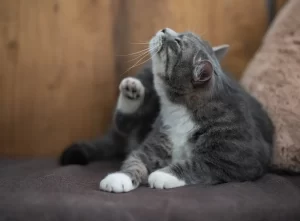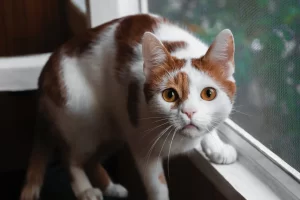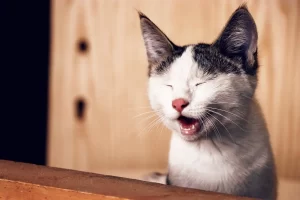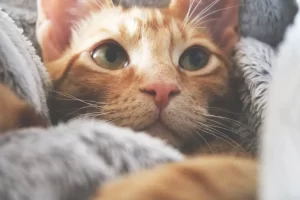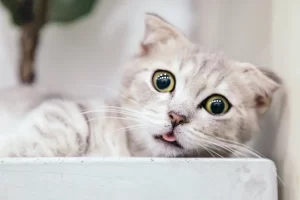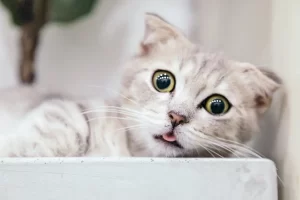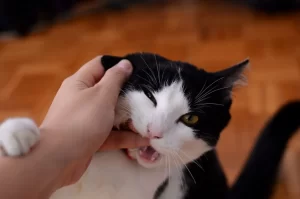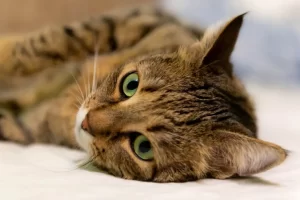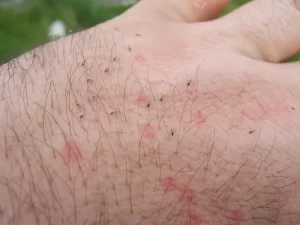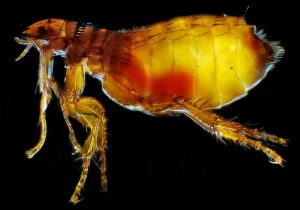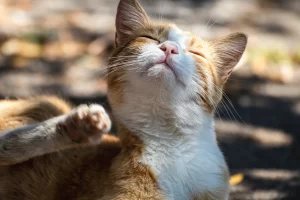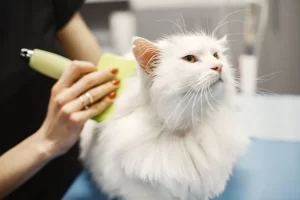Cats are susceptible to various oral health issues, including mouth sores, which can cause significant discomfort and pain. These sores can have a range of causes, from infections to traumatic injury, and they can be contagious in some cases. It is important for pet owners to be aware of the symptoms and causes of mouth sores in cats and to seek veterinary attention if they suspect their pet may be affected. In this article, we will discuss the different types of mouth sores, their symptoms, causes, and treatments, as well as the importance of maintaining good oral hygiene and preventing the spread of infection. Whether you have a feline friend with a history of mouth sores or you simply want to be proactive in protecting your pet’s oral health, this guide will provide valuable information and resources.
Table of Contents
ToggleWhat are cat mouth sores?
Cat mouth sores, also known as stomatitis or feline oral ulcerative lesion (FOUL), are a condition in which a cat’s mouth develops painful sores and inflammation. This can result from a variety of causes, including viral infections, autoimmune disorders, dental problems, and more. Symptoms of cat mouth sores may include a painful mouth, loss of appetite, drooling, swelling, bad breath, bleeding, pawing at the mouth, decreased activity level, and more. Treatment options for cat mouth sores may include medications, surgery, and changes to the cat’s diet and home environment.
Causes of cat mouth sores
The main causes of cat mouth sores are:
- Dental Issues: Tooth decay, gum disease, broken teeth, and abscesses can lead to the development of mouth sores in cats. If your cat suffers from tooth abscesses, consider trying these home and natural remedies to relieve the pain.
- Feline Herpes Virus: This highly contagious virus is a common cause of mouth sores in cats (see the proper home treatments for feline herpes).
- Feline Calicivirus: Another highly contagious virus that causes mouth sores, respiratory issues, and fever in cats. Here are some home and natural remedies for the calicivirus.
- Fungal Infections: Cats with weakened immune systems can develop fungal infections in their mouths.
- Bacterial Infections: Bacterial infections like stomatitis can cause painful mouth sores in cats.
- Trauma: Physical injuries to the mouth can result in the formation of sores, especially if the injury becomes infected.
- Foreign Objects: Cats that habitually chew on or ingest foreign objects like strings, needles, or other sharp objects may develop mouth sores.
- Allergic Reactions: Allergic reactions to certain food ingredients or environmental allergens can cause mouth sores in cats.
- Nutritional Deficiencies: Nutritional deficiencies like a lack of vitamins and minerals can lead to the development of mouth sores.
- Cancer: Mouth sores can also be a symptom of certain types of oral cancer in cats. Learn more about oral cancers in cats and associated symptoms, causes, and treatments here.
- Immune Disorders: Cats with weakened immune systems are more susceptible to developing mouth sores.
- Hormonal Imbalances: Hormonal imbalances like hypothyroidism can lead to the formation of mouth sores in cats.
- Exposure to Toxins: Exposure to toxins like chemicals and plants can cause mouth sores in cats.
- Parasites: Parasites like fleas and ticks can carry diseases that can cause mouth sores in cats. Check out our posts to see if your cat has fleas or what fleas look like.
- Chronic Stress: Chronic stress can weaken a cat’s immune system and increase the likelihood of developing mouth sores.
- Genetics: Certain breeds of cats may be predisposed to developing mouth sores.
- Age: Older cats are more susceptible to developing mouth sores due to age-related changes in the mouth.
- Poor Oral Hygiene: Neglecting a cat’s oral hygiene can lead to the development of mouth sores.
- Dental Prosthetics: Ill-fitting dental prosthetics can cause mouth sores in cats.
- Use of Certain Medications: Some medications can cause mouth sores as a side effect.
Symptoms of cat mouth sores
Here are the main symptoms seen in cats with mouth sores:
- Painful Mouth: Cats with mouth sores may exhibit signs of discomfort or pain when eating, drinking, or grooming.
- Loss of Appetite: Mouth sores can make eating and drinking painful, leading to a loss of appetite.
- Drooling: Excessive drooling or saliva production can be a symptom of mouth sores in cats (check out home treatments to stop cat drooling).
- Swelling: Swelling or redness around the mouth and lips can be a symptom of mouth sores.
- Bad Breath: Mouth sores can produce a foul odor in a cat’s breath.
- Bleeding: Mouth sores can cause bleeding, especially when eating or drinking.
- Reduced Ability to Eat and Drink: Cats with mouth sores may have difficulty eating and drinking due to pain.
- Pawing at the Mouth: Cats may paw at their mouths or rub their faces against objects to try to relieve discomfort.
- Decreased Activity Level: Cats with mouth sores may exhibit a decrease in activity level due to discomfort or pain.
- Loss of Weight: Due to a loss of appetite, cats with mouth sores may experience weight loss.
- Vocalization: Cats may meow or make other vocalizations as a result of discomfort or pain.
- Changes in Behavior: Cats may exhibit changes in behavior, such as becoming more withdrawn or aggressive, due to discomfort or pain.
- Poor Coat Condition: Cats with mouth sores may have a dull or unkempt coat due to decreased grooming.
- Sneezing and Coughing: Mouth sores can cause respiratory symptoms like sneezing and coughing. These home remedies may be used to help cats with frequent sneezing.
- Runny Nose: A runny nose can also be a symptom of mouth sores in cats.
- Changes in Urination or Defecation: Changes in urination or defecation patterns can be a symptom of mouth sores in cats.
- Lethargy: Cats with mouth sores may exhibit symptoms of lethargy or fatigue.
- Increased Thirst: Increased thirst can be a symptom of mouth sores in cats due to pain and difficulty eating and drinking.
- Changes in Sleep Habits: Cats with mouth sores may experience changes in their sleep habits, such as increased restlessness or decreased sleep.
- Reduced Interaction with People and Other Animals: Cats with mouth sores may become less social and reduce their interaction with people and other animals.
Importance of seeking veterinary attention
Seeking veterinary attention for cat mouth sores is important for several reasons:
- Proper Diagnosis: A veterinarian can properly diagnose the underlying cause of the sores and determine the most appropriate treatment plan.
- Pain Management: Cats with mouth sores experience discomfort and pain, and a veterinarian can provide pain management options to improve their quality of life.
- Prevention of Complications: If left untreated, mouth sores can lead to secondary infections and other complications. A veterinarian can help prevent these issues.
- Addressing Underlying Issues: Some underlying conditions, such as dental problems or autoimmune disorders, may be contributing to the development of mouth sores. A veterinarian can address these issues and help prevent future outbreaks.
- Treatment Options: A veterinarian can provide a variety of treatment options, including medications, surgery, and changes to diet and home environment, to manage and treat cat mouth sores.
- Monitoring Progress: Regular veterinary check-ups can help monitor the progression of the condition and adjust treatment as necessary.
- Pain-free Eating and Drinking: Treatment from a veterinarian can help cats eat and drink without discomfort, improving their overall health and quality of life.
Read more on How often do you take a cat to the vet?
Home remedies for cat mouth sores
Cat mouth sores can be a painful and uncomfortable experience for cats, but there are several home remedies that can help alleviate symptoms and promote healing. Here is a list of common home remedies for mild cases of cat mouth sores, along with details on their benefits, usage instructions, and potential drawbacks. It is important to note that these remedies should only be used for mild cases and that a veterinary exam is recommended for severe or persistent sores.
- Salt Water Rinse: A salt water rinse can help soothe and disinfect the mouth. Mix 1 tsp. of salt with 8 oz. of warm water and rinse the mouth gently. Repeat several times a day.
- Baking Soda: Baking soda can help neutralize the acid in the mouth, reducing pain and promoting healing. Mix 1 tsp. of baking soda with 8 oz. of warm water and rinse the mouth gently. Repeat several times a day.
- Aloe Vera: Aloe vera gel has soothing and anti-inflammatory properties that can help with mouth sores. Apply aloe vera gel directly to the sores several times a day.
- Chamomile: Chamomile tea can help soothe the mouth and reduce pain. Steep a chamomile tea bag in hot water for several minutes, then let it cool. Rinse the mouth gently with the tea several times a day.
- Hydrogen Peroxide: Hydrogen peroxide can help disinfect the mouth and promote healing. Dilute 3% hydrogen peroxide with equal parts water and rinse the mouth gently. Repeat several times a day.
- Coconut Oil: Coconut oil has anti-inflammatory and antimicrobial properties that can help with mouth sores. Apply a small amount of coconut oil directly to the sores several times a day.
- Milk of Magnesia: Milk of magnesia can help neutralize the acid in the mouth, reducing pain and promoting healing. Rinse the mouth gently with milk of magnesia several times a day.
- Witch Hazel: Witch hazel has astringent properties that can help reduce swelling and promote healing. Apply witch hazel directly to the sores with a cotton ball several times a day.
- Tea Tree Oil: Tea tree oil has antimicrobial properties that can help with mouth sores. Dilute a few drops of tea tree oil in a small amount of water and rinse the mouth gently. Repeat several times a day.
- Turmeric: Turmeric has anti-inflammatory properties that can help with mouth sores. Mix 1 tsp. of turmeric powder with a small amount of water to form a paste and apply it directly to the sores. Repeat several times a day.
Please remember that these remedies are for mild cases of mouth sores only. If the sores are severe or persist for more than a few days, a veterinary exam is recommended.
Offering soft or pureed foods
Offering soft or pureed foods can be beneficial for cats with mouth sores as it can help reduce discomfort and pain during eating. Here are a few tips for offering soft or pureed foods to a cat with mouth sores:
- Wet Food: Wet food is softer and easier to eat than dry food, making it a good option for cats with mouth sores.
- Pureed Food: Pureed food, such as canned pumpkin or baby food, can be fed to cats with mouth sores using a syringe or spoon.
- Homemade Meals: Homemade meals, such as boiled chicken and rice, can also be pureed and offered to cats with mouth sores.
- Temperature: Make sure the food is at a temperature that is comfortable for the cat to eat.
- Small Portions: Offer small portions of food at a time to reduce the amount of chewing and swallowing required.
Provide a comfortable and stress-free environment
Providing a comfortable and stress-free environment is crucial for cats with mouth sores as stress can exacerbate symptoms and slow down the healing process. Here are a few tips for providing a comfortable and stress-free environment for a cat with mouth sores:
- Quiet Space: Create a quiet space for the cat where it can rest and recover without interruption or stress.
- Comfortable Bed: Provide a comfortable bed or blanket for the cat to rest on.
- Gentle Handling: Handle the cat gently and avoid rough play or handling that could cause pain or discomfort.
- Avoid Stressors: Identify and eliminate stressors, such as loud noises or changes in routine, that could be causing stress for the cat.
- Play and Interaction: Offer interactive toys and games to provide stimulation and relieve stress, while avoiding activities that could cause pain or discomfort.
- Soothing Music: Play calming music or white noise in the background to create a peaceful and relaxed atmosphere.
- Familiar Surroundings: Keep familiar and comforting items, such as a favorite toy or blanket, close to the cat.
- Access to Water: Ensure that the cat has easy access to clean water at all times to prevent dehydration.
Limite the use of plastic bowls for food and water
Limiting the use of plastic bowls for food and water can be beneficial for cats with mouth sores as some cats can develop a sensitivity or allergy to the material. Here are a few tips for limiting the use of plastic bowls:
- Ceramic or Glass Bowls: Use ceramic or glass bowls for food and water instead of plastic bowls.
- Bacteria-Resistant Material: Look for bowls made of bacteria-resistant material, such as stainless steel, to reduce the risk of bacterial infections.
- Avoid Sharp Edges: Avoid bowls with sharp edges that could cause injury or irritation to the cat’s mouth or tongue.
- Clean Regularly: Clean the bowls regularly to prevent the buildup of bacteria, mold, or other harmful substances.
- Inspect for Cracks: Regularly inspect the bowls for cracks or chips that could harbor bacteria or cause injury.
Using non-plastic bowls for food and water can help reduce the risk of irritation and infection in cats with mouth sores.
Maintaining good oral hygiene
Maintaining good oral hygiene is important for preventing and treating mouth sores in cats. Here are a few tips for maintaining good oral hygiene:
- Regular Teeth Brushing: Brush your cat’s teeth regularly with a toothbrush and toothpaste specifically designed for cats.
- Dental Treats: Offer dental treats and toys that help remove plaque and tartar build-up.
- Routine Dental Exams: Schedule routine dental exams with a veterinarian to monitor your cat’s oral health and address any problems early.
- Hydration: Encourage your cat to drink more water to help flush away plaque and prevent dehydration.
- Avoid Dry Food: Limit the amount of dry food in your cat’s diet, as dry food can lead to plaque and tartar build-up.
- Regular Cleaning: Regularly clean your cat’s bowls, toys, and sleeping area to prevent the buildup of bacteria and other harmful substances.
Maintaining good oral hygiene can help prevent and treat mouth sores in cats, and can also improve overall oral health and well-being. If you have concerns about your cat’s oral health, it is important to consult with a veterinarian.
Importance of a balanced diet for cat mouth sores
A balanced diet is important for overall health and well-being, and can also help prevent and treat mouth sores in cats. Here are a few tips for ensuring a balanced diet for your cat:
- Nutrient-Dense Foods: Choose high-quality, nutrient-dense foods that provide adequate protein, fat, and carbohydrates, as well as essential vitamins and minerals.
- Variety: Offer a variety of foods to provide a balanced diet and prevent boredom.
- Wet Food: Include wet food in your cat’s diet to help increase hydration and promote oral health.
- Limited Treats: Offer limited treats, as treats can contribute to obesity and other health problems if given in excess.
- Avoid Certain Foods: Avoid foods that are known to cause oral irritation or other health problems, such as acidic or sugary foods.
- Consult with a Veterinarian: Consult with a veterinarian to determine the specific dietary needs of your cat based on its age, weight, activity level, and health status.
Examples of nutrient-dense foods for cats include canned or wet food that contains high-quality protein sources, such as chicken or fish, as well as essential vitamins and minerals, such as taurine and vitamin E. Offer a variety of wet foods, including different flavors and textures, to provide a balanced diet and prevent boredom. Avoid feeding your cat foods that are high in sugar or other unhealthy ingredients, as these can contribute to oral irritation and other health problems.
Preventing mouth sores in cats
Preventing mouth sores and the spread of infection is important for the health and well-being of your cat. Here are a few tips for preventing mouth sores and the spread of infection:
- Maintaining Good Oral Hygiene: Regularly brush your cat’s teeth, offer dental treats and toys, and schedule routine dental exams to help prevent the buildup of plaque and tartar.
- Limiting Stress: Maintain a stress-free environment for your cat by providing plenty of hiding places, toys, and opportunities for play and exercise.
- Isolation: If your cat has mouth sores, isolate them from other cats to prevent the spread of infection.
- Cleaning Surfaces: Regularly clean surfaces that your cat comes into contact with, such as bowls, toys, and bedding, to prevent the spread of infection.
- Vaccinations: Keep your cat up-to-date on their vaccinations to help prevent the spread of infectious diseases.
Monitoring Symptoms: Regularly monitor your cat for symptoms of mouth sores and other health problems, and seek veterinary attention if necessary.
Avoid harsh chemical products
Avoiding harsh chemical products is important for the health and well-being of your cat, especially if they have mouth sores. Here are a few tips for avoiding harsh chemical products:
- Avoiding Harsh Detergents: Choose gentle, unscented detergents when washing your cat’s bedding and toys to avoid skin and oral irritation.
- Non-Toxic Cleaners: Use non-toxic cleaners when cleaning surfaces that your cat comes into contact with, such as bowls and litter boxes, to avoid oral and skin irritation.
- Pet-Safe Products: Use pet-safe products, such as flea and tick treatments, that are specifically designed for use on cats, to avoid skin and oral irritation.
- Avoiding Essential Oils: Avoid using essential oils on or around your cat, as some essential oils can be toxic and cause oral and skin irritation.
- Consulting with a Veterinarian: Consult with a veterinarian before using any new products or treatments on your cat, especially if they have mouth sores or other health problems.
By avoiding harsh chemical products, you can help prevent skin and oral irritation in your cat, and ensure their overall health and well-being.
Differences between mouth sores and other oral issues
Differentiating between mouth sores and other oral issues is important for the proper diagnosis and treatment of your cat’s condition. Some common differences between mouth sores and other oral issues include:
- Location: Mouth sores typically occur on the gums, tongue, or inside the cheeks, while other oral issues, such as tooth decay, periodontal disease, or abscesses, may affect the teeth and gum line.
- Appearance: Mouth sores can range from small red or white spots to large, painful ulcers, while other oral issues, such as tooth decay, may cause yellow or brown discoloration of the teeth.
- Symptoms: Mouth sores can cause pain, drooling, and difficulty eating, while other oral issues, such as tooth decay or periodontal disease, may cause bad breath, broken or lose teeth, and swelling in the gums.
- Duration: Mouth sores can range from a few days to several weeks, while other oral issues, such as tooth decay or periodontal disease, can develop gradually over time.
Other oral issues that can affect cats include:
- Tooth Decay: Tooth decay occurs when plaque and tartar build-up on the teeth, causing the enamel to break down and the tooth to become decay. Tooth decay can cause yellow or brown discoloration of the teeth, bad breath, and sensitivity to hot or cold temperatures.
- Periodontal Disease: Periodontal disease is a gum infection that affects the gums, ligaments, and bones supporting the teeth. Symptoms of periodontal disease include red, swollen, and bleeding gums, bad breath, and loose or missing teeth.
- Dental Abscesses: Dental abscesses are pockets of pus that develop in response to a bacterial infection. They can cause pain, swelling, and difficulty eating.
- Feline Stomatitis: Feline stomatitis is a severe and painful oral inflammation that affects the gums and tongue. Symptoms include difficulty eating, drooling, and decreased appetite.
Compared to mouth sores, tooth decay, periodontal disease, dental abscesses, and feline stomatitis may have different causes, symptoms, and treatments. While mouth sores can be caused by a variety of factors, such as stress or a viral infection, tooth decay, periodontal disease, dental abscesses, and feline stomatitis are typically caused by poor oral hygiene or gum disease.
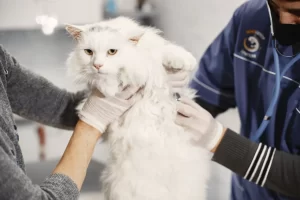
Understanding when to seek veterinary attention
It is important to seek veterinary attention if you suspect your cat may have mouth sores or any other oral issue. Some signs that it’s time to visit the vet include:
- Persistent pain or discomfort: If your cat is constantly licking their mouth, drooling, or avoiding food and water, it could be a sign of mouth sores or another oral issue.
- Visible sores or swelling: If you can see sores or swell in your cat’s mouth, it is important to have them evaluated by a vet.
- Difficulty eating or drinking: If your cat is having trouble eating or drinking, it may be due to pain or discomfort caused by mouth sores or another oral issue.
- Changes in behavior: If your cat is suddenly less active, or seems to be in pain or discomfort, it may be a sign of an oral issue that requires veterinary attention.
- Bad breath: If your cat has bad breath or a noticeable odor coming from their mouth, it could be a sign of oral infection or another oral issue.
Medications and over-the-counter medicines for mouth sores
If mouth sores or other oral issues are severe, or if home remedies are not effective, a veterinarian may prescribe one or more of the following medications:
- Antibiotics: Antibiotics may be prescribed to treat bacterial infections, such as those associated with dental abscesses or periodontal disease.
- Pain medication: Pain medication, such as nonsteroidal anti-inflammatory drugs (NSAIDs), may be prescribed to help relieve pain and discomfort caused by mouth sores or other oral issues.
- Anti-inflammatory medication: Anti-inflammatory medication, such as corticosteroids, may be prescribed to help reduce swelling and inflammation in the mouth.
- Antiviral medication: Antiviral medication may be prescribed to treat viral infections, such as those associated with feline herpesvirus.
- Immune-modulating medication: Immune-modulating medication may be prescribed to help support the immune system and reduce the risk of recurring infections.
It is important to follow your veterinarian’s instructions and to never give your cat any over-the-counter medications without first consulting with a veterinarian. Some over-the-counter medications can be harmful to cats, and incorrect dosing can cause serious health problems.
Beneficial supplements for mouth sores in cats
Supplements may be recommended by a veterinarian to support the health of a cat’s mouth and overall well-being. Some common supplements for cats with mouth sores or other oral issues include:
- Omega-3 fatty acids: Omega-3 fatty acids, such as fish oil, can help reduce inflammation and promote healthy skin and coat.
- Vitamin C: Vitamin C is a powerful antioxidant that helps support the immune system and promote healing.
- Probiotics: Probiotics can help support digestive health and maintain a healthy balance of bacteria in the mouth.
- Licorice root: Licorice root has natural anti-inflammatory properties and may help soothe mouth sores and promote healing.
- Zinc: Zinc is an essential mineral that is important for immune function and wound healing (Check out other cat wound-healing antibiotics).
It is important to follow your veterinarian’s instructions and to never give your cat any supplements without first consulting with a veterinarian. Some supplements may interact with other medications or be harmful in high doses.
Potential complications of mouth sores if left untreated
Potential complications of untreated or inadequately treated cat mouth sores or other oral issues include:
- Pain and discomfort: Mouth sores and other oral issues can cause significant pain and discomfort for cats.
- Difficulty eating: Cats with mouth sores or other oral issues may have trouble eating, which can lead to weight loss and malnutrition.
- Secondary infections: If mouth sores or other oral issues are not treated properly, secondary infections may develop, which can be painful and potentially life-threatening.
- Spread of infection: If mouth sores or other oral issues are not treated, the infection may spread to other parts of the body, including the lymph nodes, heart, and other organs.
- Poor oral hygiene: Poor oral hygiene can lead to the development of periodontal disease and other oral health issues.
Which vet to visit with what expertise
If your cat has mouth sores or other oral issues, it is important to seek veterinary attention as soon as possible. The type of veterinarian you should see will depend on the severity and complexity of the issue. Some options include:
- General practitioner: A general practitioner veterinarian is typically the first point of contact for pet owners. They can diagnose and treat many common cat health issues, including mouth sores.
- Dentist: If your cat’s mouth sores or other oral issues are more severe or complex, a veterinary dentist may be needed. They have specialized training and expertise in oral health and can provide advanced dental care, such as extractions and other surgeries.
- Dermatologist: If the mouth sores are a result of a skin condition, a veterinary dermatologist may be needed. They have specialized training and expertise in skin conditions and can provide advanced treatment options.
Are mouth sores contagious?
Some causes of cat mouth sores, such as viral or fungal infections, can be contagious. This means that they can be spread from one cat to another through close contact or shared food and water bowls.
In these cases, it is important to practice good hygiene and isolate the affected cat to reduce the risk of spreading the infection. You should also follow your veterinarian’s recommendations for treatment and care, which may include medications or other therapies to help manage the infection.

